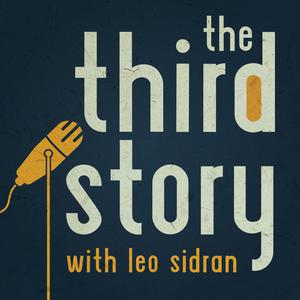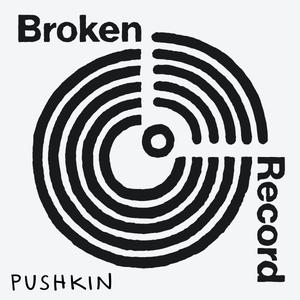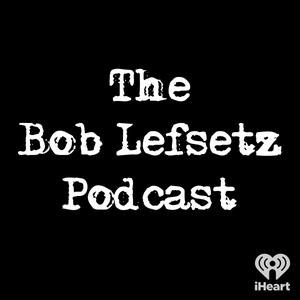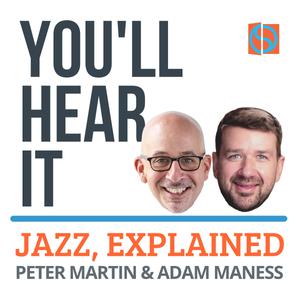
The Third Story with Leo Sidran
Leo Sidran
- 1 hour 23 minutesMary Sweeney (from 2018)
Throwback from 2018.
Mary Sweeney needs some air. “There has to be a flow of fast and slow, and a pause to allow the listener or the spectator to digest and to project their own thoughts.” She thinks I should leave more space in my podcasts, to let it breathe. She tells me this as we sit in the screened in porch behind her summer house in Madison, Wisconsin. As she tells me this, cicadas chirp loudly, as if to underscore her point: “Today’s episode will not be edited! You will not remove us from this moment!”
Mary Sweeney should know. She spent much of her career as a film editor, producer and writer collaborating with David Lynch. Beginning in 1985 with Blue Velvet, and continuing through the 2006 film Inland Empire, her editing credits include Blue Velvet (1986), Wild at Heart (1990), Twin Peaks (1991), Industrial Symphony (1991), Twin Peaks: Fire Walk With Me (1992), On the Air (1992), Hotel Room(1993), Lost Highway (1996), The Straight Story (2000), Mulholland Drive (2001) and Baraboo (2009). The relationship with Lynch was productive, fruitful, and nuanced (the two were partners in work and in life for much of that time) and they have a son together.
At the time of this interview, Mary was working as a consulting producer and writer on Matthew Weiner’s series for Amazon, The Romanoffs. She is the Dino and Martha De Laurentiis Endowed Professor of film at USC, where she teaches Graduate Screenwriting Thesis and “Dreams, The Brain and Storytelling.”
Before we had this conversation, Mary cheekily emailed me a list of topics that she would be happy to discuss. They included editing, producing, screenwriting, parenting, Paris, Cairo, pie baking, and the Catholic Church. Guess what we talked about? All of it.
And we also talked at length about living and working in an intensely creative partnership with David Lynch for all those years (both personally and professionally), collaborating with one of the most innovative voices in film, and what’s so great about coming from a big family. Visit the Patreon Page for an extra 20 minutes of juicy conversation that didn’t make it into this edit.
Thanks for listening.
ORIGINAL LINK: https://www.third-story.com/listen/marysweeney www.leosidran.substack.com https://www.patreon.com/c/thirdstorypodcast
17 January 2025, 2:47 am - 1 hour 38 minutes285: Jacob Collier's First Interview
In 2013, after having posted a series of videos recorded in his family home in North London of himself singing a cappella arrangements of classic - yet sometimes obscure - songs on YouTube, a critical mass began to form around Jacob Collier.
His videos of Stevie Wonder’s “Isn’t She Lovely” and “Don’t You Worry Bout A Thing” were passed around by musicians and music enthusiasts and by 2014 he was being managed by Quincy Jones and traveling around the world.
He was one of the first career artists to emerge on YouTube. Jacob’s journey since then has been nothing short of extraordinary. Today, at 30 years old, with six Grammys, millions of fans, and collaborations ranging from Herbie Hancock to Chris Martin, his influence spans generations. His Djesse project—four albums in six years, exploring 50 songs and countless collaborations —represents not just his creativity but his ability to bring others into his world. From arenas to intimate collaborations, Jacob Collier is now a fact of musical life.
Yet, he remains tied to his roots: the small room in his mother’s house where it all began. His first album, In My Room, was both a tribute to that space and a manifesto for his artistic philosophy.
Before his star had really begun to rise, I met with Collier in late 2014. He invited me to his family home in North London, where his mother greeted me with tea and cookies while he returned from university. When we finally sat down in his music room to talk, his brilliance was immediately apparent. He spoke about sound with sensitivity and clarity, blending perfect pitch, synesthesia, and a boundless curiosity. He was still a kid, but one with an expansive vision.
That conversation remains a revelation. It captured a young artist at the cusp of greatness. It is also the first interview of its kind that exists with the extraordinary artist .
Ten years after that first interview, I’m reminded why I started this podcast: to capture history as it’s being made. Jacob Collier’s story is one of boundless curiosity and connection—a message in a bottle that changed the tide.
Get 45% off the Magic Mind bundle with with my link: https://www.magicmind.com/LEOJAN
2 January 2025, 9:05 pm - 1 hour 10 minutes284: Aaron Parks and Marta Sanchez
Pianists Aaron Parks and Marta Sanchez on how music has helped them navigate life's complexities. Aaron talks about his move to Portugal, the release of his latest album Little Big III, and how addressing mental health shaped his journey. Marta reflects on leaving Madrid for New York and the deeply personal inspiration behind her album Perpetual Void.
www.third-story.com www.leosidran.substack.com https://www.wbgo.org/podcast/the-third-story
26 December 2024, 5:00 am - 1 hour 1 minute283: Samora Pinderhughes and Jack DeBoe
Composer, pianist, vocalist, and multidisciplinary artist Samora Pinderhughes and drummer/producer Jack DeBoe on their long standing collaborative relationship, what happens when art confronts life’s heaviest themes, but the creators meet it with laughter, lightness, and trust.
Captured at Winter Jazzfest in early 2024, Samora and Jack talk about the album Venus Smiles Not in the House of Tears, the transformative Healing Project, mental health, and how laughter becomes a tool of resilience in the face of struggle. It’s serious, it’s playful, and it’s deeply human.
19 December 2024, 4:47 pm - 1 hour 9 minutes282: Allan Tannenbaum
Allan Tannenbaum's career reads like a tapestry woven with history, art, and an extraordinary eye for the moment. From his serendipitous epiphany outside a post office in 1964 to becoming one of the most iconic photographers of his time.
Starting with a handful of frames of Jimi Hendrix in the late 60s, Allan went on to chronicle the cultural pulse of 1970s New York as chief photographer for the SoHo Weekly News. He captured unforgettable images—Sid Vicious in handcuffs, Andy Warhol at Studio 54, Patti Smith, the Rolling Stones, John and Yoko, and many more.
In the 80s and 90s, he expanded his lens to the world stage, documenting moments of historical significance: the fall of the Berlin Wall, Operation Desert Storm, the Rwandan refugee crisis, and eventually the devastation of 9/11 just blocks from his Tribeca home.
Here he talks about his life behind the lens, the philosophy that guided him, and what it means to let "the work show you the way."
www.third-story.comwww.leosidran.substack.com https://www.wbgo.org/podcast/the-third-story www.sohoblues.com/
5 December 2024, 5:05 am - 1 hour 42 minutes281: Maria Schneider
Grammy-winning composer and NEA Jazz Master Maria Schneider on 30 years of the Maria Schneider Orchestra, her life and career, from her small-town Minnesota roots to her groundbreaking collaboration with David Bowie and her fight for artists’ rights.
Here she talks about how her music channels the wonder, mystery, and tension of her life experiences, her poetic creative process, her acclaimed album Data Lords, and her reflections on what’s next as she looks back on a remarkable journey.
20 November 2024, 3:30 am - 42 minutes 20 seconds280: Ben Sidran | The Election
Just like we did after the 2016 and 2020 elections, I spoke with my dad Ben Sidran this week about the latest presidential election.
True to form, it is a conversation that appears to be about one thing but is in fact about many things. What begins as a somber acknowledgement of the election results turns quickly to a sprawling discussion of everything from Will and Ariel Durant’s massive 11-volume work, The Story of Civilization, Seinfeld, The First Council of Nicaea, Irving Berlin, Jack Kerouac, what separates humankind from the rest of the animal kingdom, bottle service at "the party club", the importance of beauty, and what it means to “chop your wood and carry water.”
11 November 2024, 5:16 pm - 1 hour 1 minute279: Andrew Bird
Andrew Bird has been on a quest for meaning in sound since childhood, starting with the violin at age four and earning a degree in violin performance from Northwestern University. His journey has taken him from classical and folk roots to the vibrant Chicago swing scene, to creative isolation in a barn in Western Illinois, and eventually to become a genre defying artist and composer with a unique voice.
Andrew’s lyrics are both confessional and impressionist, often leading listeners on a journey through evocative imagery. With just a looping pedal, he reinvented his sound, blending classical, folk, and indie rock and crafted a distinct sonic landscape that defines his music today.
After nearly three decades and 20 albums, Andrew continues to evolve. His latest release, Sunday Morning Put On, pays tribute to jazz standards while maintaining his signature sound. He describes it as a “sabbatical” project, giving him space to reflect and create without pressure.
Just recently, he released Cunningham Bird, a tribute to the classic Buckingham Nicks album. Here he shares insights about his early days, the isolation that shaped him, songwriting as a form of “speaking in tongues”and the lessons learned from performing standards.
Here he talks about his early days in Chicago, the journey that led him into isolation, discovering his sound, songwriting as a form of “speaking in tongues”, what it means to be living his life in song form, and what he learned from singing standards.
www.third-story.com www.leosidran.substack.com www.wbgo.org/podcast/the-third-story
31 October 2024, 4:15 am - 1 hour 6 minutes278: Aaron Goldberg
Pianist Aaron Goldberg on 20 years of organizing jazz fundraisers for presidential campaigns (this year's was Jazz for Kamala), how he thinks about the potential of music to provoke personal transformation and political action, his own relationship with activism and progressive politics, concert curation, Israel and Gaza.
www.leosidran.substack.com www.third-story.com www.jazzforkamala.com
22 October 2024, 6:57 pm - 1 hour 20 minutes277: Lucy Kalantari
Family music artist Lucy Kalantari on the power of intention, why gardening is her favorite metaphor for living a creative life, staying curious, parenthood, her new record, and the Grammys.
www.third-story.com https://leosidran.substack.com/ https://www.wbgo.org/podcast/the-third-story
10 October 2024, 5:49 pm - 1 hour 24 minutes276: Riley Mulherkar
Riley Mulherkar grew up in Seattle, the Pacific Northwest enclave that has been home to so many musical innovators over the years. He went to Garfield High School, a school that has fostered countless talents going all the way back to Quincy Jones who was himself a young trumpet player at the school in the 1940s. Riley was just eight years-old when he began seeing the legendary Garfield High School big-band play free gigs in his Seattle neighborhood; it’s one of the reasons he picked up the trumpet. He was clearly meant to play the instrument.
By the time he got to Juilliard in New York, Riley had shown up on the radar of Wynton Marsalis, who became a mentor. If this story is sounding familiar, it’s because it resembles the experience of so many musicians of his generation who have similar origin stories.
On a deeper level, it’s a story that echoes through the history of jazz - young musicians who are compelled to move to New York after only a small handful of interactions with their heroes.
Riley Mulherkar is very much a man of his moment, and also mindful of those echoes from the past. His new album - his first under his own name and called, simply, Riley is awash in the echoes of history but also boldly embraces contemporary sounds and textures, it reframes classic material that was influential to him and positions his original compositions in that continuum.
The album was a long time in the making. It’s the result of years of experimentation and reflection, and that patience is palpable in the music. Above all, the feeling of the record is totally compelling. And feeling was at the heart of the project all along. He says he was not interested in making something that sounded like an old record, but rather that felt the way he feels when he listens to his heroes, something he describes as “hyperrealism”.
We spoke earlier this year about how the Riley album came together - he worked closely with pianist Chris Pattishall and guitarist/producer Rafiq Bhatia - his diverse career as a collaborator, music presenter, composer, and now solo artist, and how thinking of jazz as a family tree helped him to find his place in the music.
www.third-story.com https://leosidran.substack.com/ https://www.wbgo.org/podcast/the-third-story
24 September 2024, 1:22 pm - More Episodes? Get the App
Your feedback is valuable to us. Should you encounter any bugs, glitches, lack of functionality or other problems, please email us on [email protected] or join Moon.FM Telegram Group where you can talk directly to the dev team who are happy to answer any queries.
 No Guitar Is Safe
No Guitar Is Safe
 Broken Record with Rick Rubin, Malcolm Gladwell, Bruce Headlam and Justin Richmond
Broken Record with Rick Rubin, Malcolm Gladwell, Bruce Headlam and Justin Richmond
 The Bob Lefsetz Podcast
The Bob Lefsetz Podcast
 You'll Hear It
You'll Hear It
 Wong Notes
Wong Notes
 Sodajerker On Songwriting
Sodajerker On Songwriting